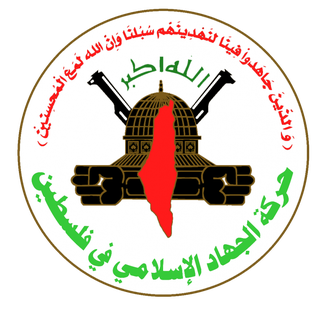Islamic Jihad emerges in Hamas shadow
In its efforts to remove Israel from the map, Hamas, the Islamist party in charge in Gaza, has a new competitor — or perhaps little brother: the Islamic Jihad resistance movement. Islamic Jihad has been growing in the shadows, an unofficial movement alongside the democratically elected Hamas, both dedicated to rocket attacks against a country they view as an occupier.

Islamic Jihad logo — Source: Wikimedia Commons
Islamic Jihad officials have argued that the greatest achievements for Hamas in the battle against Israel were achieved when they were in the “resistance” — the very position in which Islamic Jihad now finds itself, Reuters Arabic reports.
Yoni Fighel, a retired Israeli army colonel and senior researcher in counter-terrorism, argues that Islamic Jihad remains “dangerous because to a degree it is uncontrollable,” existing completely outside party politics and international diplomacy.
At the same time, it is free from the responsibilities that can burden Hamas. Fighel says: “It doesn't have to feed all the Palestinians in Gaza, so it can be much more flexible and independent.”
Reaction to Arafat poisoning report
Nine years after Yasser Arafat's death, news that he may have been poisoned stirred people both inside the Palestinian territories and across the Arab world. A Palestinian woman living in Qatar tweeted the following image in commemoration:
#ياسر_عرÙات .... < الثورة ليست بندقية ÙÙŽØسب > pic.twitter.com/4aYqtkuLfR
— رشــآ النـتـشـة (@Alnatsheh_Rasha) November 11, 2013
[“The revolution is not the gun of the revolutionary only; rather it is a farmer’s pick, a surgeon’s scalpel, a writer’s pen, a poet’s quill.” — Yasser Arafat, 1929-2004]
A Jordanian Palestinian woman tweeted similarly:
#ياسر_عرÙات #Ùلسطين *PS* pic.twitter.com/jHSM44dfsA
— Lian Mohammed (@liaano94) November 11, 2013
“One day, one of them will pass by my grave, to tell me that my country is no longer occupied.”
Al Jazeera released a special investigative report on the alleged poisoning by polonium, as supported by Swiss forensic reports. The channel’s documentary video has also been made available in English.
The Palestinian Investigative Committee has since called Israel the prime suspect in Arafat’s death.
A link to the Swiss report, published in English, has also been uploaded to the Al Jazeera website.
Breakdown in Geneva talks
The front page of the prominent conservative Iranian newspaper Kayhan called the recent Geneva talks “a mirage”:

Source: Kayhan
Negotiations over the Iranian nuclear program have grounded to a halt amid accusations between France, the U.S. and Iran. The U.S. blamed Iran for backing out of a reported deal at the last minute, while Iranian officials criticized the hard line of France. And the Iranian media accused the French foreign minister of siding with Israel.
Israeli Prime Minister Benjamin Netanyahu had characterized the deal the U.S. was pushing as “very bad,” paving the way for confrontation between the two countries.
The next meeting for the negotiations has been scheduled for Nov. 20.
Polarization in Egypt: Bassem Youssef's show canceled
Egyptian comedian Bassem Youssef — nicknamed “Egypt’s Jon Stewart” — found his show canceled just minutes before its scheduled broadcast, amid crackdowns on journalists and an overwhelming wave of hypernationalism in the country. Youssef’s El-Bernameg show had earned an international following and refused to spare the army his clever, often biting criticism.
Recent polls showed Egyptians completely split over the show’s cancellation, with 48% against and 44% supporting the suspension. Al-Arabiya called the show’s cancellation indicative of a growing polarization in Egypt.
Twitter users have not remained mute regarding Youssef’s silencing by the military-backed regime. One Jordanian cartoonist Naser Jafari posted a cartoon to that exact effect.

Floods in Baghdad
#علي التميمي #big LIKE #Baghdad #floods pic.twitter.com/NrbeBTdjvp
— Aouf A Sulaiman (@aoufasulaiman) November 10, 2013
Four days of torrential rain have flooded Iraqi streets, causing the government to declare an emergency public holiday Monday.
Deplorable conditions in Syrian prisons
The Syrian Union for the Defense of Human Rights recently published a report detailing horrific conditions in the military’s Sednaya prison, which reportedly houses about 14,000 prisoners, who include women and children.
The deplorable conditions include month-long solitary confinement, severe beatings, whippings, burning of the skin with chemicals and cigarettes, and overcrowding. Epidemics of untreated illnesses and infections were also reported, along with intentional deprivation of food and drink. Bi-weekly executions during the night were also reported, after which bodies were disposed of without notification to the families.
The great majority of the prison guards responsible for much of this torture are reportedly 20 years old or younger.
A giant rat in Yemen kills baby
A giant rat reportedly killed a one-year-old child in western Yemen, after entering the family’s mud and palm leaf shack and eating some of the child’s limbs.
Syrian refugee women open restaurant
A group of Syrian women, most of them housewives, have launched a project to sell traditional Syrian dishes in Beirut, Lebanon, with the help of the United Nations Refugee Agency. The project intends to help the refugees both preserve special characteristics of their regional culture and support their families during their time in Lebanon, while their country is at war.
“Our house was destroyed, and my husband is suffering from heart problems,” one 30-year-old woman told her fellow cooks, holding back tears. “My children cry every day because they can’t go to school in Lebanon.”
Another cook, from the city of Aleppo, told Al-Arabiya that preparing traditional dishes with other women from her country alleviated some of her homesickness: “Here, I feel like I am in my country, Syria.”
Saudi sick of insults
A member of the Saudi parliament has requested stricter laws to protect himself and other politicians from “humiliation, insult, libel and slander” on social networking sites as well as by the media.
A member of the Saudi parliament since 2005, Saud al-Shammari stressed that insulting its members constitutes an attack on the institution itself. Such attacks, potentially viewed by “millions of people,” should be classified as a “criminal offense,” he argued.





